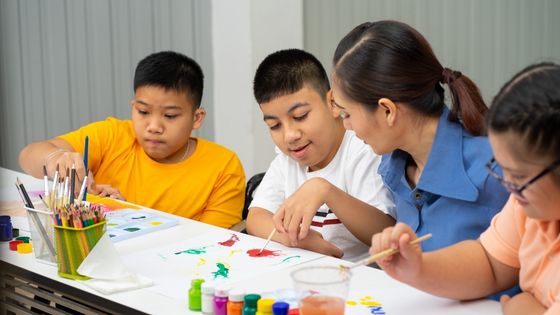Teaching social skills to children with autism is an essential aspect of their development. Social skills are crucial for building relationships, making friends, and navigating social situations. Unfortunately, children with autism often struggle with social interactions and may require specialized teaching techniques to acquire social skills. In this article, we’ll discuss effective approaches for teaching social skills to children with autism.
Utilize Visual Aids
Children with autism often learn better through visual aids, as they can struggle with verbal instructions. Using pictures or videos can be an effective way to teach social skills. For example, you can use social stories that illustrate different social situations and appropriate behaviors. Visual aids can also help children learn how to interpret facial expressions, body language, and other nonverbal cues.
Practice Role-Playing
Role-playing is a useful tool for teaching social skills to children with autism. It allows them to practice social interactions in a safe and controlled environment. You can role-play different scenarios with your child, such as greeting someone, sharing toys, or asking for help. By practicing these interactions, your child will become more comfortable and confident in social situations.
Use Positive Reinforcement
Positive reinforcement is a powerful motivator for children with autism. Praise and rewards can encourage children to practice social skills and reinforce positive behaviors. You can offer verbal praise, stickers, or small rewards for appropriate social interactions, such as saying “please” or “thank you” or sharing with others.
Teach Social Rules and Norms
Children with autism may struggle to understand social rules and norms. It’s essential to teach them explicitly what is expected in different social situations. For example, you can teach them how to take turns in conversation, how to make eye contact, or how to express empathy. Breaking down social skills into manageable parts can help children with autism learn more effectively.
Provide Opportunities for Social Interaction
Finally, it’s crucial to provide children with autism with opportunities for social interaction. This can include structured playdates, group activities, or social skills classes. Providing a supportive and inclusive environment can help children with autism build confidence and improve their social skills.
Children with autism may face unique challenges when it comes to social skills, such as difficulty with communication, social cues, and making and maintaining friendships. Therefore, it is crucial to use effective approaches that cater to their specific needs and abilities.
One approach that can be helpful is to break down social skills into smaller, more manageable steps. This can help children with autism understand what is expected of them and make it easier for them to practice these skills. For example, if you are teaching them how to initiate a conversation, you can break it down into smaller steps such as making eye contact, greeting the person, and asking a question. By practicing each step individually, children with autism can build confidence and become more comfortable with social interactions.
Another approach is to use social stories, which are short stories that illustrate different social situations and appropriate behaviors. Social stories can help children with autism understand social expectations and provide them with a visual representation of what is expected in a particular situation. For example, a social story about going to a birthday party can help a child with autism understand what to expect, how to behave, and what to do if they feel overwhelmed.
It is also important to provide consistent and positive feedback when teaching social skills to children with autism. Positive reinforcement can be an effective way to encourage positive behaviors and help children feel confident and motivated.
Praising them for their efforts and progress, providing tangible rewards, and using social reinforcement (e.g., social approval) can help reinforce positive behaviors and make the learning experience more enjoyable.
Additionally, providing opportunities for social interaction can help children with autism improve their social skills. Joining social skills groups, attending social events, and participating in extracurricular activities can provide children with autism with opportunities to interact with peers and practice their social skills in a safe and supportive environment.
Conclusion
Teaching social skills to children with autism requires a specialized approach. By utilizing visual aids, practicing role-playing, using positive reinforcement, teaching social rules and norms, and providing opportunities for social interaction, you can help your child develop crucial social skills. With patience, persistence, and a supportive environment, children with autism can learn to navigate social situations successfully. In our Delhi centre we are providing best speech and occupational therapy for autism, visit our centre for more kids therapies and best kids and teenagers counselling.




















